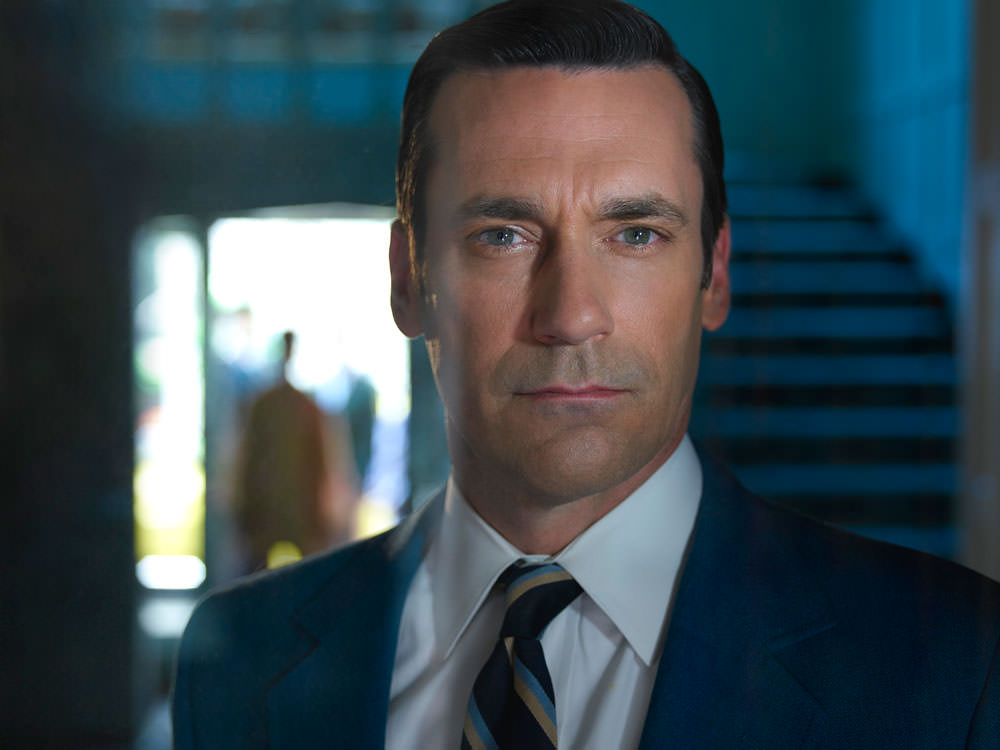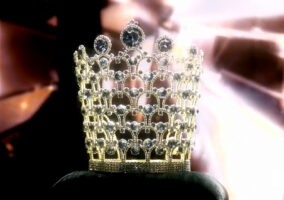We don’t know what we were expecting. In retrospect, it seems strange that we expected anything else. After all, we’ve been saying for years now that if Mad Men has a main thesis, it’s “People don’t change.” But when we got treated in the first few moments of the show, to the sight of Don and Roger in all their suave ’70s player glory, slutting and boozing it up once more, we found ourselves blurting out, “We’re here? Again?”
Don’s back to playing the syphilis lottery by sticking his Whitman into anyone in a skirt who says yes – again? Roger’s trying to juggle two girls at once – again? Don’s selling furs – again? Joan’s being treated like a sex object -again? Don’s obsessing over some reserved, dark-minded working woman who tends to speak in riddles – again? Joan and Peggy are at each other’s throats – again? Don’s turning to diner waitresses and stewardesses to service him – again? Ken’s getting jerked around because he’s too nice for this business – again? Don (unwittingly) made a woman feel like a prostitute (“You got your hundred dollars’ worth. You can go.”) – again? Pete’s complaining about his outrageous career success – again?
After everything we’ve seen these characters go through – and we’ve seen a lot – is this the best any of them can manage in terms of growth?
Is that all there is, my friend? Then let’s keep dancing.
Peggy Lee’s ennui-ridden camp classic not only makes the perfect soundtrack to this somewhat depressing status update, but it makes a rather flawless statement on the entire mindset that fueled the self-absorbed and nihilistic decade of the 1970s. Because that’s the big shock of the episode, in case you didn’t catch it. Mad Men, a show that is absolutely synonymous with the 1960s, just subverted expectations once again, by airing an episode that takes place in the final week of April 1970. We’re five months into the seventies and there are six more episodes to go before the end. Who saw that one coming? We sure didn’t. Once we figured out the date, we couldn’t help but laugh. All that talk over the years about the Manson murders and Woodstock – and Matthew Weiner gleefully zooms right past both of them and straight into the Me Decade. It’s not likely – and experience has taught us not to make predictions when it comes to this show – but it’s possible that, now that the shackles of that decade have been shed, the show can go anywhere or anywhen it wants to for its final laps. Like we said, it probably won’t, but just the illusion that it could is exciting.
And that’s kind of thematically appropriate, since there’s an illusion of change,thickly spackled over the stagnancy of these characters. Don regales the table of fur model applicants with tales of his impoverished childhood, which Roger wryly notes is something he now loves to do. This is shocking in the context of their histories. In the second episodes of the series, in a scene that is mirrored almost exactly by this episode’s diner tableau, Don, Betty, Roger and Mona sit in a booth and discuss the fact that Don never tells anyone anything about his past or his childhood. Is that growth? Change? Sure – on the surface, at least. Don is free (mainly by having reached rock bottom and clawing his way back up) to recast his horror-filled childhood as charming cornpone tales of Depression-era family comedy. But he’s still a sexually promiscuous alcoholic who comes into work and sleeps the morning away, so no, he hasn’t really changed that much. Only the trappings have; much like Roger’s ruffled shirt and Sonny Bono mustache. It may look modern (in 1970), but he’s exactly the obnoxious (but admittedly witty) pleasure-seeker he was for as long as we’ve been watching him.
Of course it’s different for a character like Joan. While it’s true that she hasn’t changed as much as one might think, it’s not remotely her fault that she’s treated like a pinup by the frat boys at McCann Erickson, despite Peggy’s rather backward-thinking implication that she should expect to be humiliated because of the way she dresses. But Joan went straight for the jugular in that way she always has when she’s gone up against Peggy – she zeroed right in on her looks and surgically disparaged them. You can make her a partner – a millionaire, even – but she’s still that same Queen Bee sauntering up and down the aisles of the steno pool and blowing smoke, both literally and figuratively.
Not that we blame Joan a bit for being harsh there. Like we said, Peggy’s not exactly open-minded when it comes to the fact that there are women in the world who aren’t exactly like her. She can be a bit judgmental, is what we’re saying. Twice this episode she said something that sounded rather classist to us. First, when Mathis was trying to set her up with his brother–in-law, she misread his awkward fumbling and said “If you want a raise, stop acting like a secretary.” Later, on her date (and let’s just enjoy the one bright spot in this episode: Peggy’s ten-years-overdue FANTASTIC first date), when Stevie notes it’s interesting that she started out as a secretary she scoffs at the idea and all but dismisses it. To Peggy, whose time as a secretary was something of a nightmare for her, “secretary” is a bit of an insult. And despite the strides Joan has made, the knowledge she’s acquired and all the hard work she’s done, Peggy, somewhat snottily, still looks at her like a secretary in a lot of ways.
This aspect of Peggy and Joan’s relationship is one of our favorites, not because we love seeing them be so cruel and thoughtless to each other, but because it’s so true to their characters’ histories and relationship with each other. Joan resented how smoothly Peggy was able to glide through that awful meeting, not least because Peggy wasn’t on the end of as many sexist comments, but also because Peggy has way more experience rebuffing and ignoring this kind of attention. Joan doesn’t have the “I hope you die in Vietnam” tools that she had at her disposal when she was an administrative professional. But Peggy’s pretty awful for making a “If you’re going to dress that way…” comment, even in the context of a less enlightened time. Given their long antagonistic history and decidedly different ways of approaching the world, it only makes sense that their sisterhood only goes so far before their vast differences rear their heads. Neither of these women would be likely to call themselves feminists (even though they both clearly are), and because of that, they can’t really see how much they have in common. People don’t change. The judgmental Catholic schoolgirl and the Queen Bee can’t see eye to eye.
Even poor Ken, who once had dreams of slipping the surly bonds of corporate America and being the next great novelist – and whose wife still has those dreams for him – just can’t pull himself out of that quicksand, even when Roger throws him a lifeline and gives him an excuse to do so. We look forward to seeing the last nice guy at Sterling Cooper get his revenge, but we can’t see this development as a happy one for him. “It’s a sign!” he exclaimed giddily to Don when he first learned of his firing. “Of what?” “The life not lived!” So much for that. This is not a group of people who are capable of grabbing the happiness that constantly seems to elude them.
Rachel Menken, however, was capable of such a thing. “She lived the life she wanted to live,” her sister told Don defiantly. “She had everything.” The news of her death hit us hard. Matthew Weiner has to know that she, above all of Don’s former girlfriends, wives, and lovers (and they are LEGION), is the one the fans of the show most often mention as the One That Got Away. Staging her return as a sexy, surreal dream sequence before letting us know of her fate made it even more poignant. “I’m supposed to tell you you missed your flight,” she says to Don, in a perfect bit of dream dialogue, randomly bubbling up from the recesses of Don’s memories, without context or meaning.
Or was it? After all, the last time Rachel and Don had any kind of serious conversation, he begged her to get on a plane and fly away with him. She recoiled from him back then in disgust. And then ten years later, she shows up in a dream, after her death (and Don has a history of seeing ghosts, remember), to point out to him that he missed his flight. He’s still stuck in this slowly deteriorating life he built. And how does he respond to this? With ad copy, because that’s all he knows. “Rachel, you’re not just smooth, you’re Wilkinson smooth.” He can’t even connect with one of the loves of his life in a dream.
So, in HIGHLY typical Don Draper fashion, he obsesses over some poor depressed waitress with the way-too-on-the-nose name of “Di,” who tells him sagely, “When someone dies you want to make sense of it, but you can’t.”
Good God, Don. This? AGAIN?
For more discussion on your favorite shows, check out our TV & Film forum.
[Photo Credit: Frank Ockenfels 3/AMC]
Mad Men Countdown: 1… Next Post:
Mad Style: Severance
Please review our Community Guidelines before posting a comment. Thank you!




